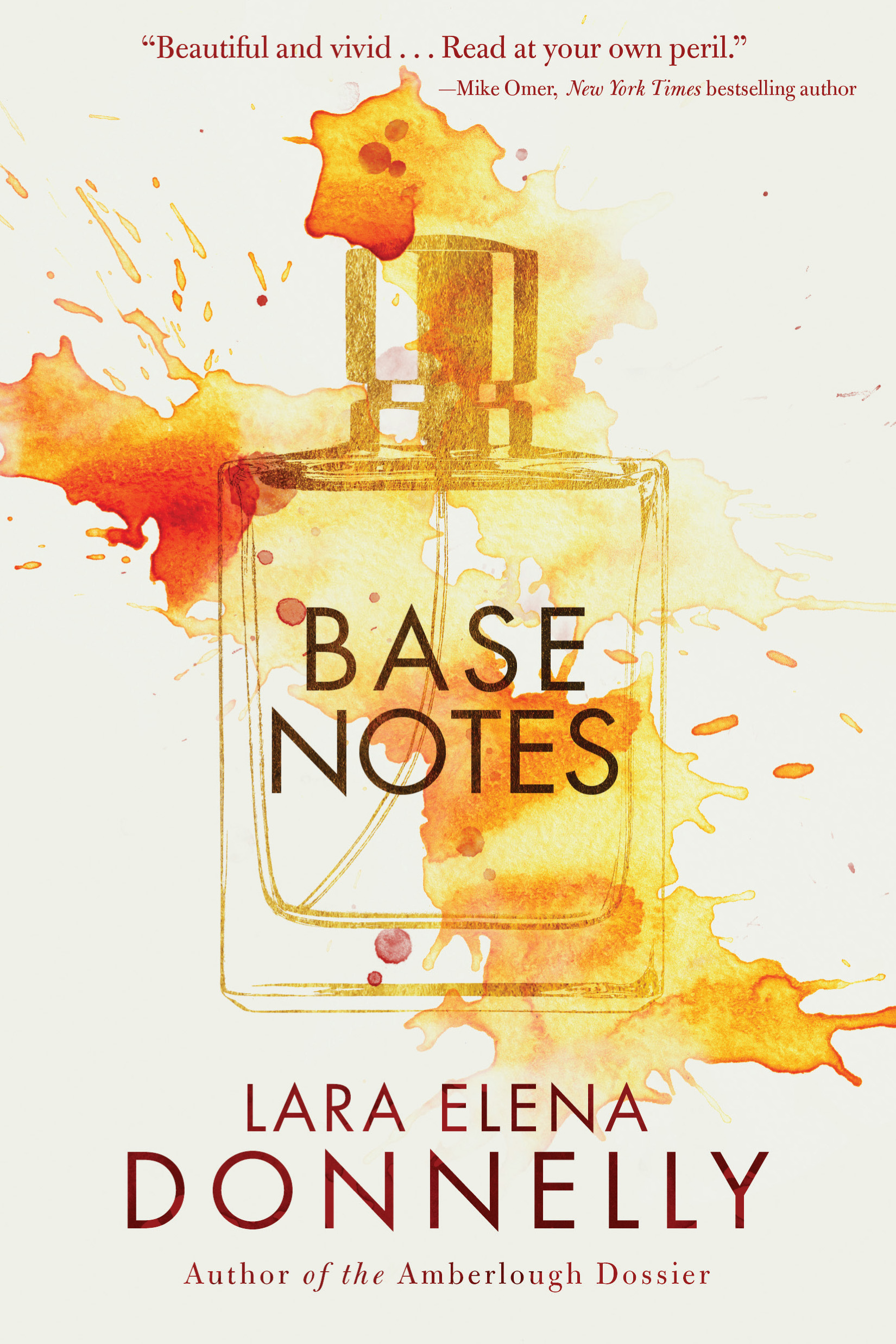Vic Fowler, perfumer and entrepreneur, has discovered a method for preserving physical memories—a kiss, a song, a fuck—through scent. The only catch is the necessary base material: the corpse of whoever one wishes to remember so thoroughly. Wealthy, dissolute businessmen are some of Vic’s best purchasers for these blends, but when one customer returns for a fresh commission that can’t be refused, the logistics require outside assistance. Vic draws a small cadre of fellow struggling artists onto the project, but as their relationships fray, tensions build, and ethics intrude, the question arises: Is there anything Vic won’t sacrifice, for art?
Base Notes is Lara Elena Donnelly’s first stand-alone novel, after completion of the Amberlough Dossier trilogy. Set amidst the ongoing gentrification of contemporary New York City, the novel balances mundane life, murderous desires, and the mysterious effects of Vic’s special perfumes alongside one another… until Vic’s house of cards begins to wobble under the weight of prior sins and present betrayals.
Base Notes is an ambitious, upsetting novel of queer horror(s). As with the richly evocative scents Vic crafts—whether from murder-victim corpses, or more traditional materials—the reading experience moves through levels. Borrowing from a descriptions of one of these oh-so-decadent perfumes,
An art-house horror movie, a Shirley Jackson novel. The top notes were sophisticated, the middle cozy. The base bodily, sexual and abject, but also stark. The shock of seeing someone nude and debauched in an abandoned house.
Buy the Book


Base Notes
Sophisticated on the surface, decaying gruesomely into the sexual and abject: a solid description of the novel, too. The story filters through Vic’s eyes, and nose—wherein the steel-strict, manicured, chilly performance of self on the surface covers a deep trough of rage and aggression. Within the first fifty pages, I’d sent a message to a friend saying something like, “okay so, the protagonist has been doing murder-for-hire… but also for pleasure, preserving compelling sexual partners’ memories forever with corpse-perfumes?” And as you might guess, Base Notes goes full-steam ahead into some dark territory from there.
I’ll first offer a tip of the glass to Donnelly on the simultaneous disinterest with/acknowledgement of gender in Base Notes. In a critical space so often obsessed with easily categorized, strict identity markers, I found their approach refreshing. Throughout the text, no pronouns are ever used for the protagonist. If pressed, I’d probably describe Vic’s gender as “cold, imperious dandy.” Asides about finding a suit fitting a certain shape of chest and hip—or, reflections on the perceptions of strangers, like the unasked-for nickname the landlady uses once—illustrate some of Vic’s experiences of the world through gender, sure. But overall? Vic simply is, a self-possessed creature whose presentation resists labeling. (God knows Vic’s sexual preferences are expansive, as well, with on-page partners of multiple genders.)
But the other big horror of Base Notes, besides the sensual art of murder, is gentrification and late capitalism. While the book focuses on perfume crafting, it’s hard to miss the echoes for novelists, visual artists, clothiers, and anyone else attempting to pursue the arts in an economic system designed to support… nothing and no one, aside from the wealthiest among us. One reoccurring refrain centers on how Vic’s mentor, lover, and first victim Jonathan Bright had only ever been miming bootstraps-lifting-artist. In reality he’d been independently wealthy, which was the only thing allowing him to run Bright House—and Vic’s lack of independent wealth is dragging the business down. Passion, or even genuine skill, ain’t enough on its own.
Despite everything else—the cruelty, self-centeredness, and avarice—Vic remains deeply sympathetic to me in those moments. By speaking the nastier fears around both financial and artistic insecurity aloud, Vic shows the reader some of the vulnerability we’re otherwise denied. For example, on reception:
All we noses ever try to do is encapsulate a moment, a feeling, a story. […] But, like all other arts, we are hindered—or developed, elevated, evolved—by the interpretation of our audience. We can provide the content, the experience, the thing. What it means to others, how it lands? All we can do is hope.
Donnelly balances a serial killer protagonist, with all the foibles and frights one expects therein, against a treatise on the back-breaking systems of service labor, urban real estate, and artistic craft. While other central characters stand as foils (or, demonstrate alternatives in the struggle), Vic allows the reader to entertain fantasies of their worst impulses. What if, maybe, you could just kill those guys who grab your tits at work, or endlessly hike the rent on your shopfront, or…? Anyone with a crushing student loan, medical debt, or a daily terror of displacement probably felt a frisson of intrigue as Vic manipulates Jane, Beau, and Giovanni around into committing murders.
But every time you start to really vibe with the “garrote someone and create a tincture from their corpse in a tub full of alcohol in the basement” plans… a scene involving a normal human person reminds you of how cruel—how utterly disinterested in the mutual care and well-being of others—Vic happens to be. The fantasy is unsustainable; the audience’s complicity is laid bare over and over again. I found that super compelling, but I’m also aware some folks are going to bounce off of the sheer awfulness. The novel refuses to allow either comfortable distance from Vic’s thoughts, actions, and beliefs or wholesale, un-guilty, fantastical immersion within them.
[Spoilers follow.]
As the novel’s last third so nastily demonstrates: Beware getting comfortable in your sympathies for Vic. All those characters whose friendship Vic has gained, used, and lost? Whose intimacies the reader has grown easy with, attached to? Vic ends up murdering them, one by one, in an ugly devolution of hands-on violence—no longer sensual, no longer artisanal—while the reader gets dragged along for the ride. No exaggeration, it’s a difficult set of scenes to get through; the murder of Barry really upset me, to the point where I had to pause for a minute. Those final chapters come as a real crash-landing, because holy shit, Vic sure does seem to get away with it… and the hollow, sick feeling that echoes afterwards is a hell of a bravura note to close a novel on. “Horror,” indeed and exactly.
As I finished Base Notes I thought to myself, everyone who got really into Hannibal has a Hannibal-book inside them. Nasty, decadent, indulgent, cruelly precise—and all the more fascinating for leaning hard into those vibes. For example, the attention paid to the constant flux of scent in the novel, so thick it’s best described as taste or texture, echoes the depth of near-erotic attention paid to food in the show. Smells structure Base Notes as guiding principle, as personal identification (sexually, or otherwise), as table-centerpiece, as display of artisanal skill, and as murder-trophy. Honestly, to do less than treat scent as a decadent, intense physical experience would undermine the immersion—and, also, horniness!—of the book itself.
And as Vic repeats throughout, “a perfume without base notes has no staying power.” For a particular sort of audience, the rich depths of Donnelly’s novel are going to be a perfect scent-match… even if, at the end, you’re left nauseous.
Base Notes is available from Thomas & Mercer.
Read an excerpt.
Lee Mandelo (he/they) is a writer, critic, and occasional editor whose fields of interest include speculative and queer fiction–especially where the two coincide. Summer Sons, their spooky gay debut novel, was recently published by Tordotcom, with other stories featuring in magazines like Uncanny and Nightmare. Aside from a brief stint overseas, Lee has spent their life ranging across Kentucky, currently living in Lexington and pursuing a PhD in Gender Studies at the University of Kentucky.










